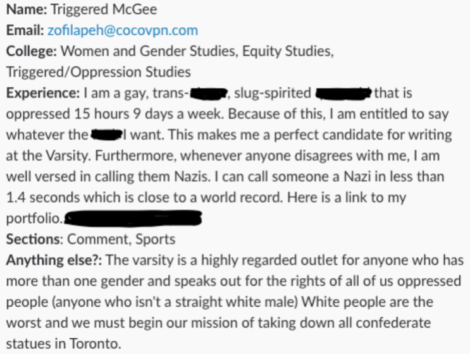It has been about two weeks since the Unite the Right rally took place in Charlottesville, Virginia, where far-right white supremacists and neo-Nazis gathered in support of a Confederate monument and clashed with anti-racist counter-protesters. The violence that ensued culminated in a car crash that killed 32-year-old Heather Heyer and injured 19 others.
Although the events of Charlottesville may feel geographically distant, we need not look further than our own backyard to see hatred manifest. In light of recent events here in Toronto, it is important for media organizations like The Varsity and institutions such as U of T to take a strong stance against racism and white supremacy.
Back in July, self-described “white nationalist” Paul Fromm spoke at a rally organized by U of T-based group Students in Support of Free Speech. In the same month, the Toronto Public Library permitted members of neo-Nazi groups to hold an event at one of its branches. Such acts of hatred and bigotry are prevalent in the online community surrounding U of T; after The Varsity posted a Facebook status condemning what happened in Charlottesville, we received a message peppered with racist and transphobic slurs (pictured below, with slurs and obscenities redacted).

Most recently, a day after the Unite the Right rally, the Canadian Nationalist Party (CNP), a newly formed white nationalist group, expressed intentions to hold a “nationalist rally” on the U of T St. George Campus.
As an institution that prides itself in being one of Canada’s leading universities, U of T needed to make it clear to the U of T community that such an event would not be tolerated. Although the university administration eventually confirmed that no such event would take place on campus, they were initially unwilling to confirm that they would indeed reject a potential room booking from the CNP, if requested. It is no surprise that 129 faculty, staff, and students have signed a letter criticizing the university’s tepid response.
It was incredibly disappointing to hear US President Donald Trump claim that “both sides” were to blame for what happened in Charlottesville. There is no equivalency between neo-nazis and so-called “alt-left” antifa activists. While it is true that members of both sides may employ violence to achieve their ends, white supremacists do so in the name of an indefensible ideology — one predicated on the hateful idea that some people are subhuman and do not deserve rights due to the colour of their skin.
In turn, institutions like universities and libraries are meant to be places for facilitating learning and dialogue. With that comes the right to hold those who choose to engage in debates accountable to basic standards of human decency. Some people may consider booting Nazis and white supremacists out of public spaces to be unjustifiable violations of free speech. We disagree. In the interest of promoting respect for all persons, institutions of higher learning can, and should, shut their doors to bigots.
As tensions continue to rise, when covering stories about racism and hatred, media outlets have a responsibility to identify them as such. Strict neutrality and the practice of weighing all sides of an issue as equally valid are commonly favoured standards within some journalistic circles, yet in light of these events, the media cannot in good conscience equivocate white supremacists with groups fighting against oppression. To do so would erroneously imply that the people whose livelihoods are at stake in these conflicts somehow share responsibility for their own dehumanization.
As is well known among our regular readership, this isn’t the first time The Varsity has come out against false balance. In our coverage of a so-called “rally for free speech” organized in support of Professor Jordan Peterson last October, we made it clear that some attendees at this rally were propagating hatred. Some attendees were overheard uttering transphobic slurs, while one attendee could be heard saying that “we need more Michael Browns,” referring to an unarmed Black man who was brutally killed by police in Ferguson, Missouri in 2014.
In the wake of The Varsity’s coverage of the rally, then-Editor-in-Chief Alex McKeen penned a Letter from the Editor adamantly rejecting the notion that the two sides involved in the conflict were equivalent. We continue to stand by McKeen’s statements and will strive not to allow false balance to creep into our news reporting in the future.
We also refuse to tolerate hatred that is directed our way. Though we welcome input and criticism from readers who wish to engage in respectful dialogue about our coverage, bigots and cowards have no standing in that conversation.
It is imperative that media organizations and powerful institutions alike do not fall into the trap of normalizing hatred by affording credence to its perpetrators. Though the administration has now banned the CNP from hosting a rally at U of T, it would be deeply disturbing if the university were to treat such an event as it would any other rally.
Reflecting on Charlottesville in a statement issued on August 16, U of T President Meric Gertler wrote that “bigotry, hate, intolerance and violence have no place on our campuses.” In this regard, we encourage students to be watchful of the administration’s future responses to hatred. On our part, as journalists, we will strive to hold them accountable to their word.


